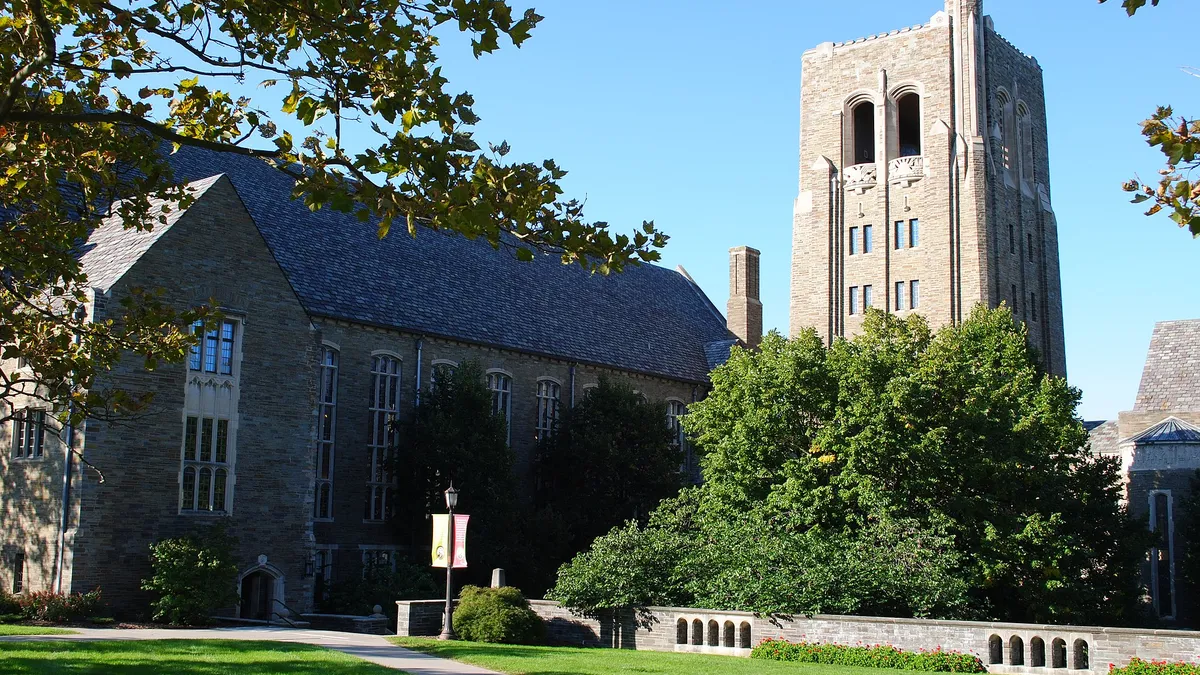Dive Brief:
- Cornell Law School and the University of Chicago Law School will continue to participate in U.S. News & World Report’s rankings, despite many of their top-placed peers abandoning the listings out of concern they compromise tenets of the legal profession.
- The dean of Cornell Law, Jens David Ohlin, said in a statement that though he believes the rankings “distort academic decision-making,” a contingent of law schools rejecting them “will not have the desired impact that many assume that it will have.” He called for a deep conversation about how rankings affect law schools, the legal profession and higher education at large.
- Meanwhile, the University of Chicago will continue submitting information for the rankings in part because they are opinionated lists, and the institution does not wish to suppress opinions, Thomas Miles, its law school dean, said in a recent message to students.
Dive Insight:
Cornell’s and the University of Chicago’s continued involvement with the rankings stands out against a recent revolt by law schools.
Most schools in the top 15 spots on U.S. News & World Report’s list have said they will no longer provide data to the publication. They argue the rankings penalize law schools that try to promote public-interest careers and that they harm historically marginalized applicants.
The mass exodus of law schools began with Yale and Harvard universities earlier this month.
In response, U.S. News said it will still publish the rankings of nearly 200 accredited law schools, regardless of whether they submit data, citing its “journalistic mission.”
Much of the information U.S. News uses to calculate the rankings is public, the Cornell law dean pointed out in his message.
Law schools provide the American Bar Association statistics like applicants’ standardized assessment scores, acceptance rates and faculty count. The ABA in turn makes those details public, Ohlin said.
“The reality is that U.S. News & World Report is a journalistic enterprise, and they don’t need anyone’s permission, including mine, to publish a ranking, and they have ready access to information from the ABA and other public sources to construct their rankings,” Ohlin said.
He said what is needed is a “searching” conversation about the role of rankings, a difficult feat to achieve considering “it will require us to fight our natural tendency to want to win a competition, even if we didn’t create that competition or agree with its rules.”
Ohlin said he would pledge to make academic quality the focus at law schools instead of rankings.
Miles, the University of Chicago law dean, said institutions should encourage prospective students to critically evaluate the rankings on their own and ask what value the lists hold.
He said he feels no ranking can capture the essential features of the University of Chicago law school.
“What makes the Law School distinctive is its unabashed enthusiasm for the life of the mind — the conviction that ideas matter, that they are worth discussing, and that a single viewpoint or style of thought should not be imposed,” Miles said.
The University of Chicago Law School and Cornell Law School hold the No. 3 and No. 12 spots on the 2023 rankings, respectively.
Other highly rated law schools’ withdrawal from the rankings has prompted debate about whether U.S. News lists will still hold sway at the undergraduate level.
Many colleges tout their high placements on the Best Colleges rankings. However, behind closed doors, their leaders often abhor the listings, complaining they lead institutions to bend their missions to climb the ladder. The rankings have also come under fire for relying on flawed metrics, such as a reputational survey administrators complete to judge peer institutions.
Recently, top federal officials have come down on the rankings. U.S. Education Secretary Miguel Cardona in a speech earlier this year derided rankings systems based on prestige.
And after Yale and Harvard announced their moves away from the lists, James Kvaal, the U.S. Department of Education's top higher ed official, posted on Twitter that the country “needs to move past rankings' harmful incentives and recognize many forms of college excellence.”










